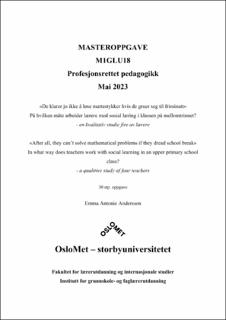| dc.description.abstract | Sosial læring har fått en sentral plass i den nye læreplanen LK20, og begrepet har blitt et eget punkt under læreplanens prinsipper for læring, utvikling og danning. Skolen skal være med å bidra og støtte til elevenes sosiale læring, både gjennom arbeid med fagene og ellers i skolehverdagen. Formålet med denne masteroppgaven er å bidra til å belyse læreres arbeid med sosial læring. Problemstillingen for masteroppgaven er som følger: på hvilken måte arbeider lærere med sosial læring i klassen på mellomtrinnet? De to forskningsspørsmålene til oppgaven er: hvordan opplever lærere samspillet i klassen? Og hvilke tiltak, på gruppe- og individnivå, legger læreren vekt på? Kvalitativ metode benyttes som fremgangsmåte i studien, og jeg intervjuet fire kontaktlærere på mellomtrinnet på sentrumsnære skoler i Oslo. Funnene fra intervjuene ligger til grunn for datamaterialet. Lærerne viser at de er genuint opptatte av det sosiale miljøet i klassen, og er bevisste på at samspillet, som er preget av å være et hierarki hvor elevene tar og får tildelt ulike roller. Tre overordnede tema var gjennomgående i de fire lærernes svar da de ble spurt om hvordan de arbeider med sosial læring: 1) at lærerne opplevde et stort ansvar vedrørende elevenes sosiale læring, men opplever samtidig å ikke bli tatt på alvor når de ber om støtte til elever som strever sosialt. Sosial læring blir i tillegg i liten grad blir diskutert i profesjonsfellesskapet 2) at lærerne benyttet seg av familiemetaforen når de snakket om prinsippene deres for å bygge et inkluderende klassefellesskap, og har fokus på å arbeide med et godt læringsmiljø som en forutsetning for å arbeide faglig, og på å skape en samarbeidskultur der elevene respekterer og er snille med hverandre og 3) at lærerne fokuserte på tiltak som rettet seg mot å ansvarliggjøre elevene, slik at klassen til slutt skal evne å regulere seg selv, og håndtere konfliktsituasjoner på egenhånd 4) at lærerne fokuserte på å sikre inkludering gjennom å støtte til deltagelse og medvirkning hos elevene som strever sosialt og faglig i klasserommet. Det mest sentrale funnet er at lærerne arbeider med sosial læring fordi de selv er engasjerte i temaet, og ikke fordi det står i læreplanen.
Social learning now has a central place in the new curriculum (LK20), through a separate subsection under the curriculum’s principles for learning, development, and education. The schools now have to contribute to and support the pupils’ social learning, both through working with different subjects, and otherwise through everyday school life. The purpose of this master’s thesis is to contribute to illuminate how teachers work with social learning. The thesis question for this master thesis is: in what way does teachers work with social learning in an upper primary school class? The two research questions for this thesis are: how do teachers experience the social dynamics in their class? And what measures, both on a group and an individual level, do teachers value? A qualitative method is utilized to approach the thesis question, and I interviewed four class teachers who works in upper primary school classes. They all work in schools in Oslo, close to the city center. The findings from these interviews constitutes the basis for the data material. Through the interviews, the teachers show that they are genuinely interested in and concerned about the social environment in their classrooms. Furthermore, they are aware of social interactions, which is usually characterized as a hierarchy with different roles. Through the interviews, I discovered four common themes among the interviewees when asked about their work with social learning. 1) the teachers experienced a big responsibility concerning the pupils’ social learning, but at the same time experienced not being taken seriously when they asked for support with students who struggle socially. In addition to this, social learning is not commonly discussed in the professional community. They focus on creating a positive teaching environment as a condition to work with subjects, and to create a collaborative culture where the pupils are kind to one another, and to treat others with respect 3) the teachers focused on making the pupils responsible, with the aim to create a self-regulating class, where the pupils are able to handle conflicts by themselves 4) the teachers focused on ensuring inclusion, through supporting pupils who struggle socially or academically, to participate and to involve themselves in the classroom. This study showed that teachers work with social learning because they find it to be an engaging topic, rather than it being introduced through the new curriculum. | en_US |
